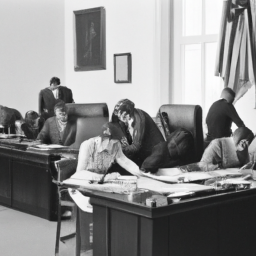Members of the Trump administration were not the first federal employees to have crossed the line into prohibited political advocacy. Over a century ago, a pivotal event prompted the passage of the Pendleton Act, also known as the Civil Service Act, in 1883. This landmark legislation aimed to reform the American civil service system, which was marred by political patronage and corruption.
The Pendleton Act was a direct response to the assassination of President James A. Garfield in 1881. Garfield's assassin, Charles Guiteau, was a disgruntled office-seeker who believed he was entitled to a government position due to his political loyalty. This tragic event shed light on the dangers of the prevailing spoils system, where government positions were handed out as rewards for political support, leading to inefficiency and rampant corruption.
Chester A. Arthur, Garfield's vice president who ascended to the presidency following his assassination, recognized the urgent need for civil service reform. In 1882, Arthur delivered a powerful address to Congress, urging them to pass legislation that would end the spoils system and establish a merit-based civil service. This speech set the stage for the subsequent passage of the Pendleton Act.
The Pendleton Act introduced significant changes to the civil service system. It established a merit system based on competitive examinations, ensuring that federal employees were selected based on their qualifications rather than political connections. This shift towards merit-based appointments aimed to create a nonpartisan bureaucracy, free from political interference, and focused on promoting efficiency and accountability.
The act also created the United States Civil Service Commission, which was responsible for overseeing the implementation of the new merit system. The commission was tasked with conducting exams, certifying eligible candidates, and preventing political influence in personnel decisions. This marked the beginning of a professionalized civil service that valued competence and expertise.
The passage of the Pendleton Act had far-reaching consequences. It not only transformed the civil service system but also had a profound impact on American politics. By removing political patronage from the equation, the act aimed to create a more impartial and effective government apparatus. It also helped to restore public trust in the federal government by reducing corruption and ensuring fair and open competition for government positions.
Throughout the years, the Pendleton Act's merit-based civil service system has undergone further refinements and amendments. However, its central principles have endured, shaping the foundation of the American bureaucracy. Today, federal employees are hired based on their qualifications and abilities, contributing to the efficient functioning of the government.
In conclusion, the passage of the Pendleton Act in 1883 was prompted by the assassination of President James A. Garfield and the subsequent recognition of the need for civil service reform. This landmark legislation introduced a merit-based system, replacing the spoils system and establishing a nonpartisan bureaucracy. The Pendleton Act remains a testament to the importance of professionalism, accountability, and fair competition in federal employment.
